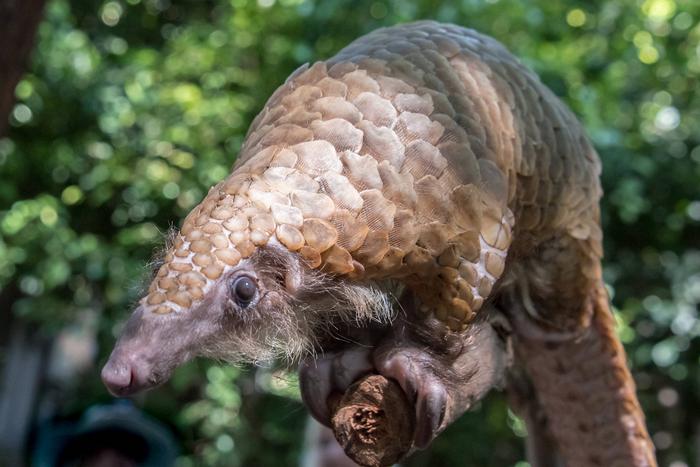All pangolin species are now endangered due to the illegal trade of their scales across the world. Efforts to understand the trade and conserve the species have been hampered by a lack of knowledge about the source of scales seized in the trade – where did they come from? By applying a genomic analysis to scales seized in Hong Kong, and comparing the results to a reference database, we now know that pangolins for Asian markets have been sourced across West and Central Africa. The international team, spanning four continents and several countries, was co-led by Professor Timothy BONEBRAKE of The University of Hong Kong (HKU), Dr Jen TINSMAN, and Professor Thomas SMITH of University of California, Los Angeles (UCLA). The findings have been published in the journal Science.

Credit: Frank Kohn, US Fish & Wildlife Service
All pangolin species are now endangered due to the illegal trade of their scales across the world. Efforts to understand the trade and conserve the species have been hampered by a lack of knowledge about the source of scales seized in the trade – where did they come from? By applying a genomic analysis to scales seized in Hong Kong, and comparing the results to a reference database, we now know that pangolins for Asian markets have been sourced across West and Central Africa. The international team, spanning four continents and several countries, was co-led by Professor Timothy BONEBRAKE of The University of Hong Kong (HKU), Dr Jen TINSMAN, and Professor Thomas SMITH of University of California, Los Angeles (UCLA). The findings have been published in the journal Science.
The endangered white-bellied pangolin (Phataginus tricuspis) has a distribution across Central and West Africa that spans over 6 million km2. It is one of the most trafficked mammals on Earth, as its scales are used in traditional medicine in Asia. However, when authorities manage to intercept and seize scales being traded illegally, we are only able to know the location of transit, without knowledge of where the animal was killed or which ecosystem is being impacted by this exploitation. Several years ago, Professors Bonebrake and Smith were working on research in Cameroon and began discussing the possibility of applying genomic tools to change this and better understand the impact of illegal trade for white-bellied pangolins. Nevertheless, they faced two big challenges that needed to be overcome for their plan to succeed. First, the team needed a reference database of white-bellied pangolin genomic data across its vast distribution in Africa, and second, they required access to seized scales in Asia.
To overcome the first challenge, the team assembled collaborators from Cameroon, Nigeria, Gabon, and other countries to find samples for the reference database. In all, 111 samples were used to construct the reference database. For the second obstacle, the researchers teamed up with Kadoorie Farm & Botanic Garden and the Agriculture, Fisheries, and Conservation Department of the Hong Kong SAR Government. These organisations had the foresight to see the long-term scientific value of preserving samples of scales from seizures. In total, 643 seized scales were analysed from these samples. Using a genomic analysis based on four million Single Nucleotide Polymorphisms (SNPs) of white-bellied pangolins, the team was then able to find the locations where pangolins were sourced from by matching the genetic signatures between the seizure samples and the reference database. Interestingly, there was little correspondence between the transit sources and the sources of pangolins themselves, indicating high levels of movement of scales prior to shipping to Asia. In addition, the results demonstrated dynamic changes in the sourcing of white pangolins for Asian markets – in 2012 pangolins were largely sourced from West Africa, but over time the origin of pangolins shifted towards Central Africa by 2018.
The study highlights the utility of genomic tools in illuminating the complex spatial and temporal dynamics that underlie illegal wildlife trade. Knowledge of these patterns can assist authorities in increasing enforcement efforts at both the source and destination points of the trade. The findings can also direct conservation resources towards the locations where the impacts of trade for exploited species (white-bellied pangolin in this case) are the highest. By tracking the origin-to-destination pathway of scales, scientists and authorities can map out how best to support pangolins.
The international nature of illegal wildlife trade necessitates international cooperation in scientific investigation and conservation. Professor Timothy Bonebrake from the HKU School of Biological Sciences noted, “I’m proud of what we’ve accomplished here, but it was only possible thanks to our dedicated and knowledgeable partners all over the world. Also, the work isn’t over. Now we need to focus on supporting organisations, governments, and communities to continue these types of international collaborations and applications of scientific tools in order to ensure the persistence of white-bellied pangolins and other endangered species globally.”
“Developments over the past couple of years have been encouraging,” said Dr Jen Tinsman of UCLA’s Center for Tropical Research. “If we can get our tracking methods into the hands of enforcement officers in those countries where pangolins are most threatened, it would allow near real-time monitoring of illegal trade and help shut it down.”
This research was supported by a Research Grants Council Research Impact Fund award (R7021-20, PC: Bonebrake). Dr Caroline DINGLE, Honorary Senior Lecturer in the School of Biological Sciences, HKU, and two PhD students in the School (Tracey-Leigh PRIGGE and Taneisha BARRETT) also contributed to this research as co-authors.
The journal paper can be accessed at Science website: DOI: 10.1126/science.adi506
Images download and captions: https://www.scifac.hku.hk/press
For media enquiries, please contact Ms Casey To, External Relations Officer (tel: 3917-4948; email: [email protected] / Ms Cindy Chan, Assistant Director of Communications of HKU, Faculty of Science (tel: 3917-5286; email: [email protected]).
Journal
Science
DOI
10.1126/science.adi5066
Method of Research
Experimental study
Subject of Research
Not applicable
Article Title
Genomic analyses reveal poaching hotspots and illegal trade in pangolins from Africa to Asia
Article Publication Date
14-Dec-2023




